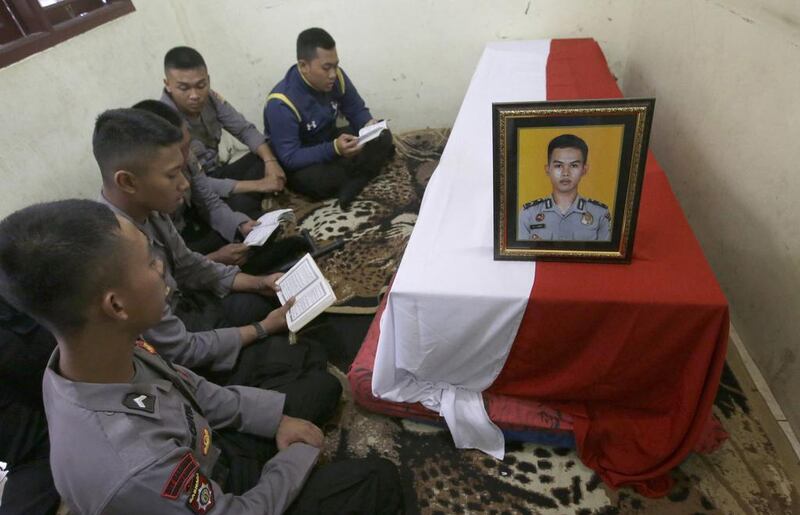JAKARTA // Indonesia’s president has ordered a thorough investigation of deadly twin suicide bombings in the capital suspected to have been carried by militants with links to ISIL.
Three policemen were killed in the attack near a Jakarta bus terminal on Wednesday night, and six officers and five civilians were injured.
In a televised address to the nation on Thursday, president Joko Widodo said he had ordered police to “thoroughly investigate the networks of the perpetrators and hunt them to the roots” and called for people to “stay calm and remain united”.
The police’s elite antiterror squad, Densus 88, which has played a leading role in tracking down and killing some of Indonesia’s most wanted militants, is now taking the lead in the investigation.
The bus station bombing was the deadliest attack in Indonesia since January last year, when a suicide blast and gun assault claimed by ISIL left four attackers and four civilians dead in central Jakarta.
Police believe they were specifically targeted in the bombing. The attack came as they were preparing to provide security for a traditional torch parade near the Kampung Melayu terminal, which is an area frequented by locals but not foreigners.
The bombers were identified as Ichwanul Nurul Salam, 40, and Ahmad Sukri, 32, both from West Java. The head of the provinces’s antiterror squad said their relatives had been taken in for questioning and DNA tests.
National police spokesman Setyo Wasisto said nails, buckshot and aluminium flakes found at the scene suggested that the bombs were similar to a pressure-cooker bomb that exploded in a vacant lot in February in Bandung, the West Java provincial capital. The suspected bomber in that attack fled into a municipal building and set it alight before he was fatally shot by police.
West Java police spokesman Yusri Yunus said Salam’s wife told investigators that the bombs used in Wednesday’s attack and the February blast were assembled by another militant she identified only as Agus.
“We are now looking for Agus who is still at large,” Mr Yunus said. “He’s dangerous.”
Police said they raided the homes of two suspects in West Java on Thursday, one in Bandung city and another in the nearby city of Cimahi. Relatives of both men, whose identities have not been released, were taken in for questioning.
Police identified the man killed in February as a member of Jemaah Ansharut Daulah, a network of almost two dozen Indonesian extremist groups that formed in 2015 and pledges allegiance to ISIL leader Abu Bakr Al Baghdadi.
JAD members are believed to have contact with Bahrun Naim, an Indonesian fighting with ISIL in Syria, and the group has been linked to numerous plots in Indonesia, including the January 2016 attack in Jakarta.
In March, police shot dead a suspected JAD member and wounded another as they tried to escape a raid. At least six other militants were arrested, including some accused of trying to establish a militant training camp in eastern Indonesia and suspected of having links with Abu Sayyaf militants in the southern Philippines.
Last month, police said they arrested three suspected militants who were accused of planning to attack a police station in East Java.
Indonesia has long struggled with extremist militancy and has suffered a series of attacks in the past 15 years, including the 2002 Bali bombings by an Al Qaeda-linked group in which 202 people were killed, including 88 Australians.
Australian prime Minister Malcolm Turnbull told parliament on Thursday that he had phoned Mr Jokowi to offer condolences.
Australia and Indonesia plan to jointly host an Asia-Pacific summit in August aimed at coordinating against the security threat posed by home-grown extremist militants returning from battlefields in Syria and Iraq.
* Agence France-Press and Associated Press





